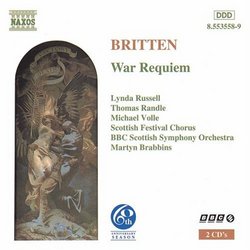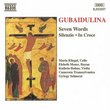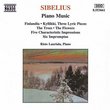| All Artists: Benjamin Britten, Martyn Brabbins, Lynda Russell, Thomas Randle, BBC Scottish Symphony Orchestra, Choir of St Mary's Festival Chorus, Michael Volle Title: Britten - War Requiem / L. Russell · T. Randle · M. Volle · BBC Scottish · M. Brabbins Members Wishing: 0 Total Copies: 0 Label: Naxos Release Date: 11/5/1996 Genre: Classical Styles: Opera & Classical Vocal, Historical Periods, Early Music Number of Discs: 2 SwapaCD Credits: 2 UPC: 730099455824 |
Search - Benjamin Britten, Martyn Brabbins, Lynda Russell :: Britten - War Requiem / L. Russell · T. Randle · M. Volle · BBC Scottish · M. Brabbins
 | Benjamin Britten, Martyn Brabbins, Lynda Russell Britten - War Requiem / L. Russell · T. Randle · M. Volle · BBC Scottish · M. Brabbins Genre: Classical
|
Larger Image |
CD DetailsSimilar CDs |
CD ReviewsGood Recording for the Price. Colin Stave | Portland, OR | 02/28/2000 (4 out of 5 stars) "I personally have performed this piece with the Oregon Symphony/Portland Symphonic Choir/Portland Symphonic Boy/Girl Choir. This recording is very good despite some minor background noise as well as even slight tempo problems on rare occasion. I believe the intonation and interpretation in this recording is especially good and explores the greatest variety in style and dynamics. The recording itself is very clean and the program notes very informative. If this piece is of interest to you I would recommend this recording." WARS FOR FLAGS DAVID BRYSON | Glossop Derbyshire England | 09/25/2005 (5 out of 5 stars) "A great deal of careful planning has gone into this production. The work calls for a separate boys' choir and chamber orchestra in addition to the main forces, and the need to convey a sense of space has been taken very seriously. Apparently no church in all Scotland was considered large enough, and the recording was finally done in a converted large workshop at the site of the old Harland and Wolff shipyard in Clydebank, only half a mile from our family home when I was a boy. I find the result outstandingly successful. The sense of space and distance must surely have been what Britten was after, and it needs to be played at a high volume setting. This will not blow you out of the room or disturb the neighbours - Britten's Requiem is a much quieter piece in general than not only Verdi's but even Mozart's. Britten takes the text that Verdi took including the Libera me prayer from the graveside service and adds the In paradisum set by Faure although not by Verdi, and intersperses it with poems by Wilfred Owen. Despite the length of the text there is comparatively little repetition of words, and the overall duration of the work is only roughly similar to Verdi's. For all the traditional text, this is not a traditional Requiem as even Verdi's was although he had little in the way of religious conviction. Owen's poems are the spiritual core of the War Requiem, the liturgical text serving as background. When the poet asks `All death will He annul?' I sense that Britten's answer is `Not likely'. Creation will not rise again to answer to any judge, and what we destroy stays destroyed. The nearest we are given to a pacifist's answer to the unsolved problem is in the lines addressed to the field-gun Be slowly lifted up, thou long black arm, Great gun towering toward heaven, about to curse; Reach at that arrogance which needs thy harm, And beat it down before its sins grow worse; But when thy spell be cast complete and whole, May God curse thee, and cut thee from our soul! Conductor, soloists and the Scottish ensembles cover themselves with distinction from start to finish. Speeds in some of the choral episodes are on the swift side, but that gives me no problem where the choral texts are something akin to a chain of linking recitatives. The soloists are worthy successors to Britten's own, the choral work is admirable and the BBC Scottish Orchestra is a fine band indeed these days. Above all, don't be nervous or hesitant about turning the volume up if you want to get the proper impact from the careful staging of the production. Naxos - well done again, very well done indeed. There is not a recording of this great work that I know from any source, perhaps not even from Britten himself with Pears and Fischer-Dieskau, that I could recommend ahead of this one." A very musical, forthright War Requiem, in very good sound Santa Fe Listener | Santa Fe, NM USA | 09/20/2006 (5 out of 5 stars) "This recording dates from 1996, after a special live performance at Glascow's Mayfest. Having never heard of any of the performers except for baritone Michael Volle (the best of the three soloists), I wasn't prepared for the stunningly clear sound given to the chorus--we can understand every syllable--and the choristers themselves were hand-picked from Scotland's best. The conductor, Martyn Brabbins, leads a vigorous, forthright, powreful reading. I was surprised to find that I preferred him to Rattle, Masur, and Gardiner, with only Hickox and Britten himself offering superior interpretations. The BBC Scottish orchestra sounds first-rate as well.
For sheer emotional impact, a lot of this performance yields to none. It is much less self-consciously mournful than the composer's famous Decca recording. Just listen to the passionate choral outbursts in the Dies Irae, which are shattering here. The Gramophone grumbled that the soloists aren't poetic enough or sensitive to the meaning of what they are singing. It's a fair criticism, but in terms of pure singing and letting us here the texts, each of them is commendable. Again, I found myself liking the overall tone, energetic and at times operatic. So count be a big fan of this Naxos bargain set, which marches ahead of recordings from more famous (and expensive) competitors." |

 Track Listings (3) - Disc #1
Track Listings (3) - Disc #1


